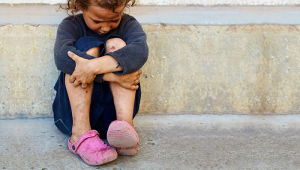“The prospects for solving UK poverty currently look worrying” according to the report, which found that 16% of pensioners now live in poverty, up from 13% five years ago.
The proportion of children living in poverty has also gone up over the same period, from 27% to 30%.
Three key factors are contributing to this rise in poverty, the charity argued: falling welfare benefits in real terms, high costs for renters and the fact that employment is no longer a guaranteed route out of poverty.
The research found that overall one in eight workers now live in poverty, a total of 3.7 million people in the UK, while nearly half of the poorest working-age adults see more than a third of their income go on housing costs.
The poorest fifth of the population were also found to be the most likely to live in homes which fall below minimum standards of safety and comfort.
The JRF warned about other social problems which accompany poverty.
Around one in four of those on the lowest incomes report experiencing depression or anxiety, it said, while one in six of the poorest pensioners are socially isolated.
This also has an effect on children. Kids in lower income families are more likely to quarrel with their parents and less likely to “discuss important issues with them”, the report said.
This data shows that previous progress fighting poverty is being undone, according Campbell Robb, the JRF’s chief executive.
“These worrying figures suggest that we are at a turning point in our fight against poverty,” Robb said.
“Political choices, wage stagnation and economic uncertainty mean that hundreds of thousands more people are now struggling to make ends meet. This is a very real warning sign that our hard-fought progress is in peril”.
Robb said tackling child and pensioner poverty had provided millions of families with better living standards and financial security.
He continued: “However record employment is not leading to lower poverty, changes to benefits and tax credits are reducing incomes and crippling costs are squeezing budgets to breaking point.”
Office for National Statistics figures have shown UK unemployment fell by 52,000 in the three months to August to 1.4 million.
“The Budget offered little to ease the strain and put low income households’ finances on a firmer footing.”
JRF’s Katie Schmuecker cricitised chancellor Phillip Hammond to doing little for hard-pressed families in the Budget, which she says he could have done through the social security system.
“As we prepare to leave the EU, we have to make sure that our country and our economy works for everyone and doesn’t leave even more people behind.”
Hammond revealed in the Budget the Office for Budget Responsibility figures in the Budget showing this year’s growth rate had been revised down from 2% to 1.5%.
The report follows on from its 2016 Strategy to Solve Poverty.











